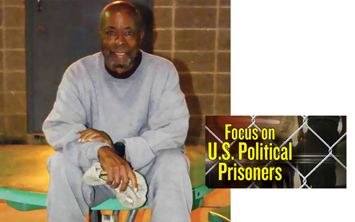Sundiata Acoli - ‘They are determined to bury him alive’
By Michael Z. Muhammad -Contributing Writer- | Last updated: Dec 14, 2016 - 12:01:24 PMWhat's your opinion on this article?
While the passing of Fidel Castro shed light on revolutionary Assata Shakur who lives in exile in Cuba, it also sheds light on the case of Sundiata Acoli who was arrested with Ms. Shakur. He’s spent more than four decades behind bars even though he was eligible for parole in 1992. Each time he’s come before the parole board he’s been denied. His recent denial, just days before the passing of Fidel Castro, was extremely difficult according to his legal team because his next eligibility will be in 15 years.

|
“When the parole board denies parole, they can determine how long the sentence can be extended. They set the term limit for when a person can be eligible for parole again. In Sundiata’s case, its 15 years,” Fayemi Shakur, a member of Mr. Acoli’s legal team told The Final Call. “It’s particularly brutal. He will be 80 in January. The recidivism rate for seniors is near zero. They continue to deny him because they say he hasn’t expressed regret. They ask him questions about what happened but at his age he says he doesn’t remember any accounts of the day,” she explained.
“He has a loving community and family waiting for him. He’s served the sentence the judge gave him. He’s a respected elder and the prison officials have recognized his accomplishments. The parole board is over stepping its reach.”
Sundiata Acoli’s battle with the New Jersey police started in 1973. He was traveling with Assata Shakur and Malik Zayad Shakur (no relation) on the New Jersey Turnpike. State troopers stopped them, reportedly because of a broken headlight. They exit the car with their hands up. Shots were fired and when the smoke cleared, two were dead, State Trooper Werner Foerster and Malik Shakur. Ms. Assata Shakur and Mr. Acoli were charged with the death of State Trooper Foerster.
That’s the Sundiata Acoli most know. What most don’t know is that he graduated from Prairie View A & M College of Texas in 1956 with a B.S. in mathematics. “He was a Math Whiz and was recruited by NASA in 1963. The next year in 1964 SNCC (The Student Nonviolent Coordinating Committee) organized Freedom Summer. They brought people to Mississippi to help register Blacks to vote. “That started Sundiata on revolution,” former New Jersey Black Panther leader Zayid Muhammad told The Final Call.
“He got dissatisfied with nonviolence and joined the Black Panther Party. He walked away from NASA. Imagine what kind of cushy bourgeoisie life he would have today. He didn’t have to heed the call. But he answered the drummers call to struggle. This is part of the untold story of Fidel’s passing.”
Growing numbers of supporters reject the parole board’s view that Mr. Acoli deserves to remain behind bars. In 2014, a panel of New Jersey judges ordered the board to “expeditiously set conditions” for his release. The Guardian reported that the court cited his good behavior since 1996, and argued the board had ignored a psychologist’s 2010 testimony that Mr. Acoli, “expressed regret and remorse about his involvement” in the state trooper’s death. The expert determined Mr. Acoli posed a, “low to moderate risk” of reoffending.
Those recommendations had little sway with the parole board. In a July article titled, “Ride and Denied and Denied,” Mr. Acoli explained what happened at his parole board hearing in July. “The hearing lasted from about 9 a.m. until about 4 or 5 p.m. It reached a new level of examination, cross-examination and recrimination,” noted the article.
“Again they questioned me primarily about the events on the turnpike and almost nothing about my many positive accomplishments. They also asked, ‘Aren’t you angry that they broke Assata out of prison instead of you?’ My response was, ‘No, I don’t or wouldn’t wish prison on anyone’”.
Most of Acoli’s four decades of incarceration were spent at “super max” federal penitentiaries in Marion, Illinois and Fort Leavenworth, Kansas, where he was held 23 hours a day in his cell under high security. Currently, he is incarcerated at a medium security federal prison in Cumberland, Maryland.
“They are determined to bury him alive,” his attorney Soffiyah Elijah told the Guardian. “And we are equally determined to get him out.” She plans to appeal the decision to deny him parole.
INSIDE STORIES AND REVIEWS
-
-
About Harriett ... and the Negro Hollywood Road Show
By Rabiah Muhammad, Guest Columnist » Full Story -
Skepticism greets Jay-Z, NFL talk of inspiring change
By Bryan 18X Crawford and Richard B. Muhammad The Final Call Newspaper @TheFinalCall » Full Story -
The painful problem of Black girls and suicide
By Charlene Muhammad -National Correspondent- » Full Story -
Exploitation of Innocence - Report: Perceptions, policies hurting Black girls
By Charlene Muhammad -National Correspondent- » Full Story -
Big Ballin: Big ideas fuel a father’s Big Baller Brand and brash business sense
By Bryan Crawford -Contributing Writer- » Full Story






 Click Here Stay Connected!
Click Here Stay Connected!








